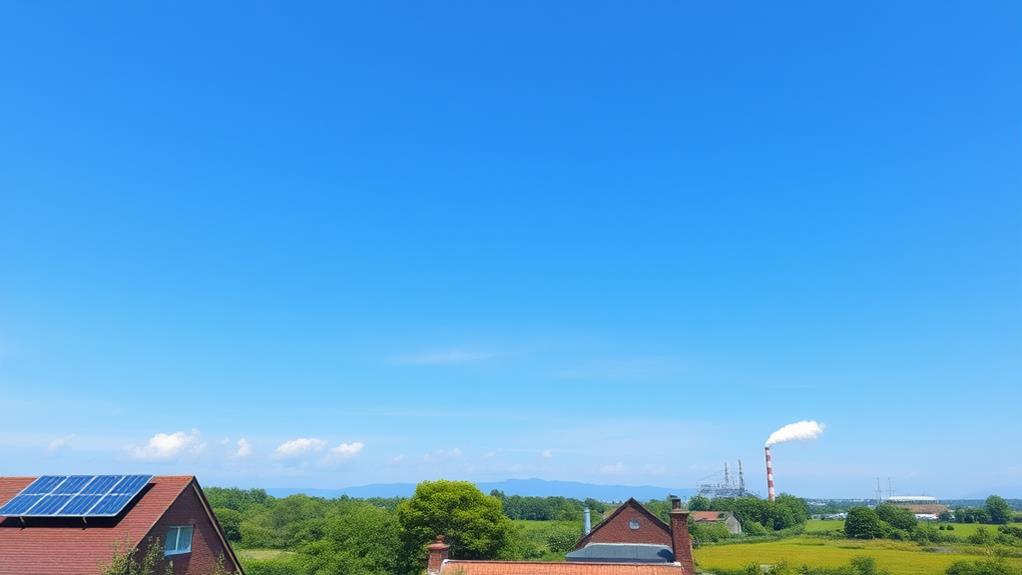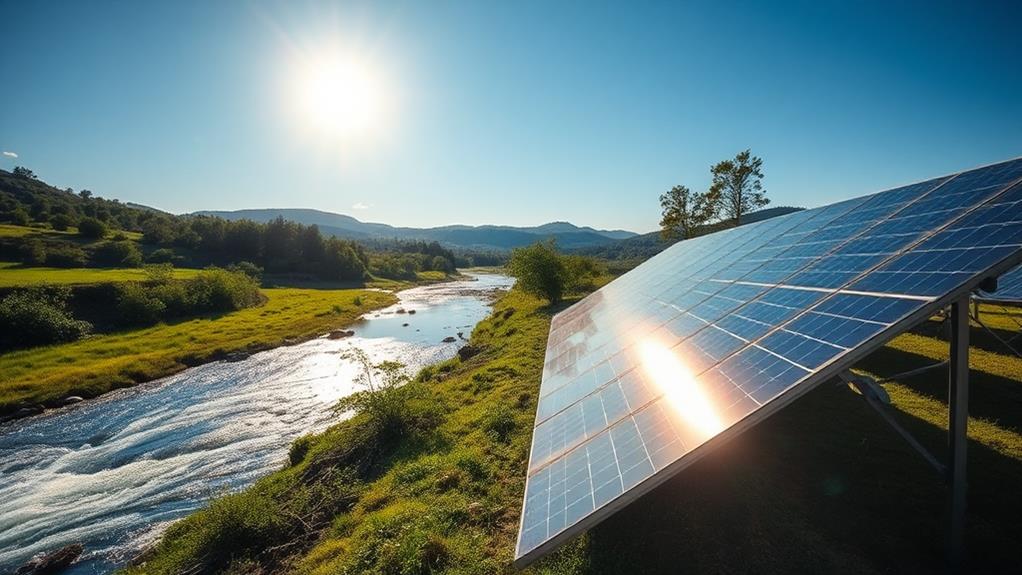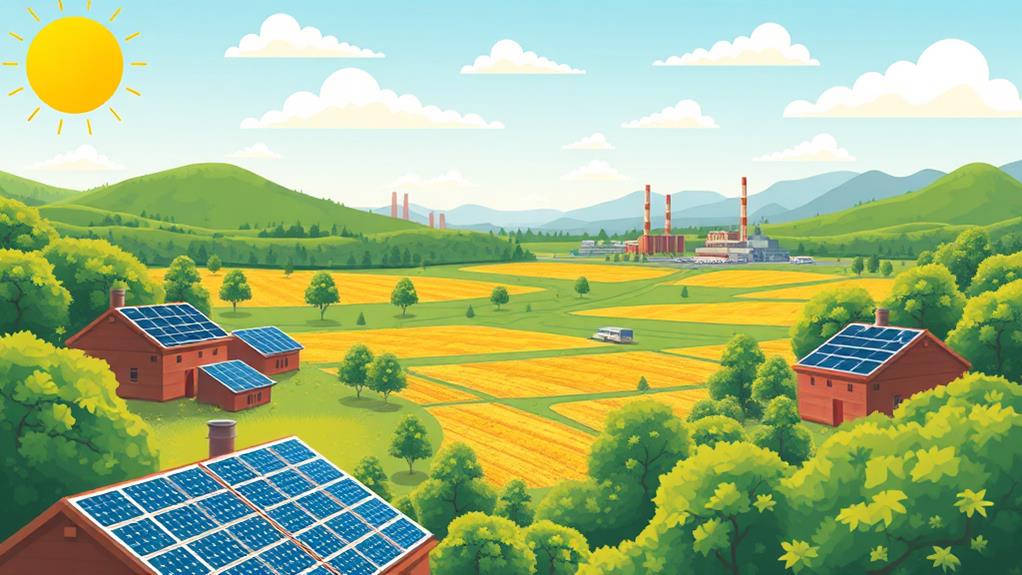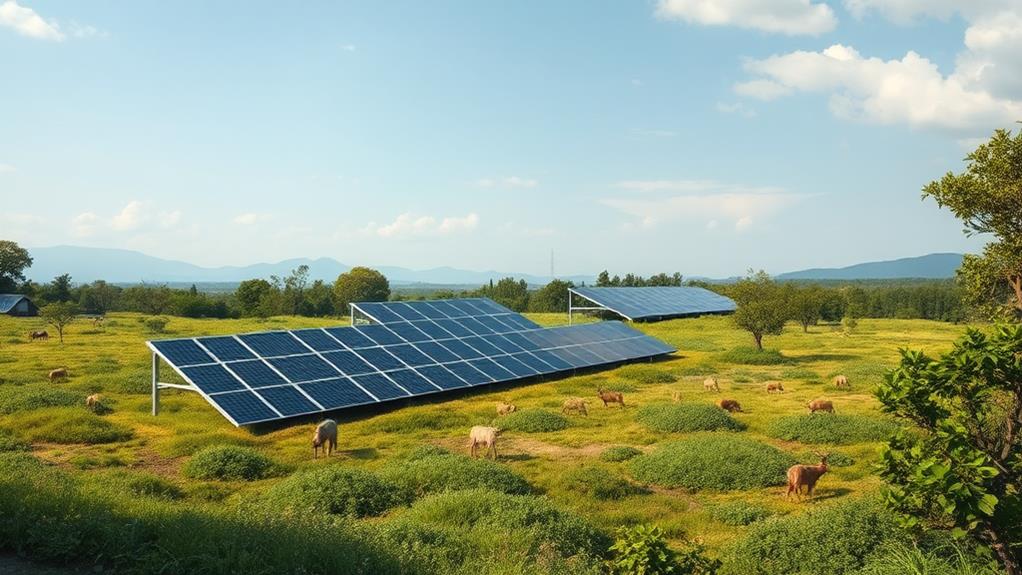Using solar energy offers impressive environmental benefits. It greatly reduces greenhouse gas emissions by decreasing reliance on fossil fuels, fundamentally lowering your carbon footprint. Solar panels generate electricity without emitting harmful pollutants, improving air quality and reducing health risks. This clean energy also conserves water resources, unlike traditional power plants that consume vast amounts of water. In addition, solar energy lessens dependence on finite fossil fuels, contributing to climate change mitigation. Strategic installation of solar farms helps minimize habitat destruction and can even coexist with agricultural activities. Continue to uncover these and other advantages in detail.
Reduces Greenhouse Gas Emissions

Solar energy, by its very nature, greatly reduces greenhouse gas emissions. When you adopt solar technology, you're directly cutting down on the reliance on fossil fuels, which are major contributors to greenhouse gases.
Solar panel efficiency has markedly improved over the years, making this renewable energy innovation an increasingly viable option for reducing your carbon footprint. Solar energy contributes to a cleaner environment by reducing fossil fuel reliance and promoting sustainable development.
Consider the lifecycle emissions of solar panels. From production to decommissioning, solar panels produce considerably fewer greenhouse gases compared to traditional energy sources.
With advancements in solar panel efficiency, you can generate more electricity per square meter, maximizing energy output while minimizing environmental impact. The initial energy investment for manufacturing solar panels is quickly offset by their long-term benefits.
Moreover, integrating renewable energy innovations into the grid helps stabilize energy supply and reduces the need for carbon-intensive peaking power plants.
This shift not only curtails greenhouse gas emissions but also promotes energy independence and sustainability. By investing in solar technology, you're contributing to a cleaner, healthier planet.
Analyzing the data, it's evident that solar energy offers a powerful solution to mitigate climate change and drive sustainable development.
Lowers Air Pollution

By shifting to solar energy, you considerably lower air pollution levels. Traditional energy sources like coal and natural gas release pollutants such as sulfur dioxide, nitrogen oxides, and particulate matter. These contaminants degrade air quality and pose significant health risks, including respiratory diseases, cardiovascular issues, and even premature death.
In contrast, solar power generates electricity without emitting harmful pollutants. Additionally, solar thermal systems capture heat without combustion, further reducing pollutants.
Several studies highlight the substantial health impacts of poor air quality. For instance, the World Health Organization estimates that outdoor air pollution causes approximately 4.2 million premature deaths globally each year. By adopting solar energy, you directly contribute to reducing these alarming statistics. Improved air quality can lead to fewer hospital visits, lower healthcare costs, and a healthier population.
Moreover, solar energy reduces the demand for fossil fuels, which are major contributors to air pollution. When you install solar panels, you're not just generating clean energy; you're also reducing the need for pollutant-heavy power plants.
This shift has a cascading effect, leading to cleaner air and a more sustainable environment.
Conserves Water Resources

Switching to solar energy also conserves water resources, an essential but often overlooked benefit. Traditional energy production methods, such as coal, natural gas, and nuclear power, require substantial water for cooling and steam generation. In contrast, solar photovoltaic (PV) systems use negligible water, primarily for occasional cleaning of panels. This significant reduction in water usage underscores solar energy's alignment with sustainable practices.
Furthermore, off-grid solutions offered by companies like Sunstore Solar can provide reliable power without the need for water-intensive processes. By adopting solar energy, you're contributing to water conservation efforts. For instance, thermoelectric power plants in the U.S. alone account for nearly 40% of the nation's freshwater withdrawals. The shift to solar can mitigate this massive water demand, particularly in arid regions where water scarcity is a pressing concern.
This conservation is essential, given the increasing stress on global water resources due to population growth and climate change. Additionally, solar energy production doesn't involve water contamination risks associated with fossil fuels, like oil spills or coal ash leaks. By investing in solar technology, you're fostering a cleaner, more sustainable future.
Embracing solar energy isn't just about generating electricity; it's about adopting a holistic approach to resource management that guarantees the longevity and health of our planet's crucial water resources.
Decreases Dependence on Fossil Fuels

Reducing dependence on fossil fuels is one of the most impactful benefits of adopting solar energy. By integrating solar power, you can considerably cut down on the consumption of finite resources like coal, oil, and natural gas. This shift not only helps in achieving energy independence but also paves the way for sustainable development.
Evidence shows that solar energy systems can produce electricity without emitting greenhouse gases, making them a cleaner alternative. For instance, the U.S. Energy Information Administration reports that every megawatt-hour of solar-generated electricity can offset approximately one metric ton of carbon dioxide emissions. This reduction in emissions directly contributes to mitigating climate change.
Regular maintenance, such as improving efficiency by 20% or more through cleaning, can further enhance the performance of solar panels. This guarantees maximum output and sustainability.
Furthermore, solar energy enhances energy independence by diversifying the energy mix. Relying less on imported fossil fuels reduces geopolitical risks and market volatility, providing a more stable energy supply.
Adopting solar technology can also stimulate economic growth by creating green jobs, further supporting sustainable development.
Minimizes Habitat Destruction

Frequently overlooked in discussions about renewable energy, solar power considerably minimizes habitat destruction compared to traditional energy sources. When you consider the land required for coal mining, oil drilling, and natural gas extraction, it's evident that these processes cause significant disruption to ecosystems.
In contrast, solar farms can be strategically located in areas with minimal environmental impact. You might wonder how solar farms achieve this. By utilizing already degraded lands, such as brownfields or abandoned industrial sites, they avoid encroaching on untouched habitats. This thoughtful placement guarantees that existing wildlife corridors remain intact, allowing animals to move freely and maintain their natural behaviors.
In addition, solar installations can be designed to coexist with agricultural activities, a practice known as agrivoltaics. This dual-use strategy not only preserves the land but also enhances its productivity.
Evidence shows that crops grown under solar panels can benefit from reduced water evaporation and protection from harsh weather, creating a win-win scenario for both energy generation and agriculture.
Conclusion
Imagine a world where you can breathe cleaner air, conserve precious water, and reduce your carbon footprint. Sounds ideal, right? By choosing solar energy, you're not just dreaming—you're actively making this future possible. It's not just about cutting costs; it's about cutting greenhouse gases, lowering pollution, saving water, and preserving natural habitats. The evidence is clear: solar energy isn't just an option; it's a necessity. Are you ready to make the switch?


